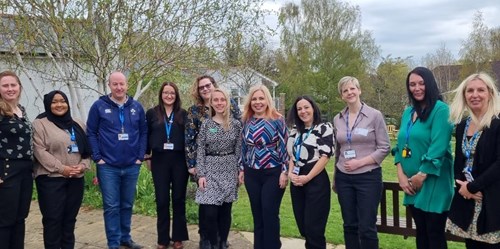Dying Matters Awareness Week
Dying Matters Awareness Week (Monday 8 May to Sunday 14 May) is organised by Hospice UK and encourages us to get talking and not struggle alone to face the realities of dying, death and grief.
Our Macmillan Cancer and Palliative Care Psychology Service support adults who have cancer or are receiving palliative care for other diagnoses, as well as their families and carers.
We also have a Palliative Care Nursing Team, who support patients with incurable advanced and progressive illnesses.
As part of Dying Matters Awareness Week, Dr Danielle Bream-Jackson, one of our clinical psychologists in cancer and palliative care, talks about how she supports patients to talk openly about their feelings about mortality and death.
 In my experience, I’d say that when someone is facing their own mortality, they’ve already thought about it deeply before they come to us for their first session.
In my experience, I’d say that when someone is facing their own mortality, they’ve already thought about it deeply before they come to us for their first session.
Regardless of whether they’ve just been told their disease is palliative or curative, I think most people I’ve supported have considered their own death in much more detail after being told they have cancer.
Whether they’ve had the opportunity or space to discuss this with someone else though is a different matter, and usually when people come to their first session in our service, it’s the first opportunity they have to really explore their ideas and feelings about dying.
Other times, we might support someone who has been diagnosed with a palliative condition for a number of years who is perhaps experiencing progression in their disease, so the reality of their death is coming closer and closer to them and their family.
How to start a conversation
I think it’s tempting to shy away from the conversation about death and dying because it can seem so monumental and scary. But I really advocate for open conversations about death.
It’s the only universal experience all living things on the planet will go through, so why would we shy away from such a shared experience?
Even if we have not been affected by death, it’s likely we know someone who has. I think acknowledging this reality with patients can sometimes be helpful.
It can also be helpful to acknowledge how difficult these conversations be, so making sure patients feel safe in the therapy space is also very important.
Managing our feelings
I say to almost every patient I see that there’s no right or wrong way to have cancer (or whichever disease they may have), and I really do believe that.
Any feelings you have when you have been diagnosed with something like cancer are completely valid.
So I try to give patients a space to talk about these emotions and a chance to explore what it is exactly they feel, because it’s quite common for people to come to us feeling a lot of things, but not really being sure what emotions they’re connecting with exactly.
Helping people is a privilege
Ultimately, I find my work a real privilege because I am involved in people’s lives at a really critical time - a time when they’re potentially coming to terms with their own mortality.
We only die once in life, so it’s important that everyone has a chance to have the best death they can, whatever that looks like.

